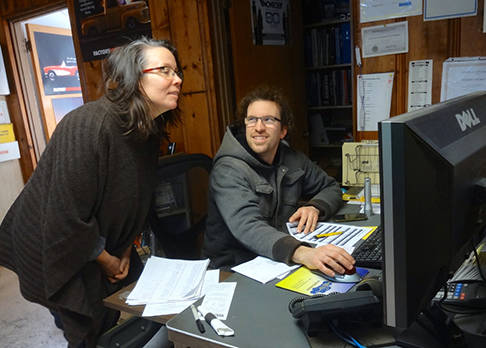
“I’m thinking of the city as one big co-op,” she says. “We’re all members of this community and, ideally, we’re ‘one person, one vote’ with the same level of influence in policy decisions. Practically, that’s not happening, but it’s something I’m going to be quite outspoken about.”
Kemble was just elected alder of Madison’s north side City Council District 18 on a people-centered economic development platform.
A former PhD candidate in Anthropology and African Studies, Kemble traded her academic career to champion cooperative development. She’s president of the U.S. Federation of Worker Cooperatives (an NCBA CLUSA member organization) and sits on the executive committee of CICOPA, a branch of the International Co-operative Alliance that promotes worker cooperatives. Kemble also serves as president of CICOPA North America and vice president of CICOPA Americas.
Oh, and she still drives taxi on weekend nights for the worker-owned and operated Union Cab—“the biggest and, dare I say, best taxi company in the city,” Kemble says.
A lifetime member of healthcare cooperatives and credit unions, Kemble’s first experience as a worker-owner was at Union Cab, a taxi cooperative serving south-central Wisconsin, where she started working 15 years ago during a lull between jobs.
“It blew me away,” she said. “I couldn’t believe that a company of 200 worker-owners, representing such a diverse range of people, could actually run their own $6 million company. It opened my mind to a whole new world of economic democracy. You look out there and realize that there’s no ‘them’ making decisions for us. It’s us. We get to be the protagonist of our own story.
“That’s why I still drive taxi.”
As newly-elected alder, Kemble is committed to building economic democracy in Madison. Deeply troubled by the trajectory of Wisconsin state politics, Kemble’s frustration peaked in 2011 when Governor Scott Walker proposed a bill to eliminate public-sector labor unions.
“We occupied the capital for three weeks, but working people lost, the bill got passed and the effects have been really devastating, especially in rural communities where schools are central to community life,” Kemble says.
In response, Kemble and other cooperative leaders met with local union leaders to discuss how best to re-democratize labor unions and reclaim a strong voice for workers. A partnership developed and further discussions with the mayor resulted in the Cooperative Enterprise Development Initiative, which allocates $5 million over five years toward the development of cooperative enterprises in Madison.
When Kemble ran for public office last fall, she wanted to be a strong, cooperative voice in Madison to ensure that those resources benefit the people who need them most.
“I feel a sense of urgency about defending the democratic spaces still left to us,” Kemble says. She believes there are seats on city councils and in schools districts nationwide well within the reach of ordinary citizens—her own successful campaign cost just $8,000.
Kemble was also motivated by Madison’s growing income inequality and racial disparities. Dane County, which Kemble represents, has the highest incarceration rate of African American men in the entire country, per capita. While the press regularly covers the inequality, what’s missing, Kemble says, is analysis about the forces that drive inequity and the citizen engagement needed to reverse it.
“I’m building more robust participatory structures in my district that can be a model for the rest of the city and really give people who have given up on politics a sense of empowerment and ownership,” she says.
Kemble is a big supporter of mutual aid and “neighbor-to-neighbor” solutions to the challenges Madison faces. During her time as president of the Dane County Time Bank—the oldest and largest time bank in the U.S.—the organization spearheaded a restorative justice program that pairs non-violent troubled students with adult mentors in the community who share similar interests. Another project sees Union Cab offering free rides to the polling places during elections.
Cooperatives, she says, could be a major solution to inequity. “We need to build the capacity of the people in our neighborhoods who are underemployed or unemployed. No one’s told them that it’s an option to create your own cooperative enterprise. You don’t have to be an entrepreneur by yourself; you can engage in collective entrepreneurship, spread the risk, and also start spreading the profits.”
Kemble believes that investment in cooperative development would lead to truly sustainable changes in Madison. While she acknowledges that co-ops face increasing pressure to de-mutualize or merge, she says the member loyalty, participation and the “collective genius” that is co-op membership can compete with market forces.
“Co-ops facing these pressures really need to get their members engaged in thinking about how to uphold our values in a world that is less and less cooperative and more and more competitive and cutthroat. The world we live in doesn’t have to be a zero sum game. We’re people, we created the system we live in, and we can change it if we have the collective will to do so.”


